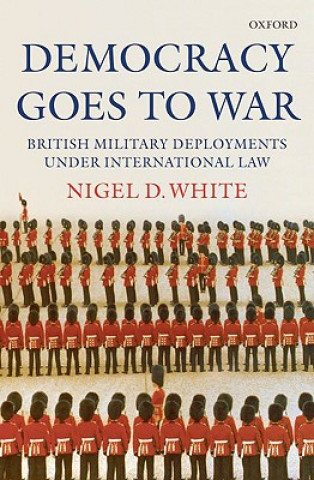
Livraison
Guide d'achat
16 124 897 livres à l’intérieur 175 langues






Afficher toutes les langues (175)
2 047 051 livres numériques à l’intérieur 101 langues






Afficher toutes les langues (101)





Cela ne vous convient pas ? Aucun souci à se faire ! Vous pouvez renvoyer le produit dans les 30 jours
 Bon d’achat
n'importe quelle valeur
Bon d’achat
n'importe quelle valeur
Impossible de faire fausse route avec un bon d’achat. Le destinataire du cadeau peut choisir ce qu'il veut parmi notre sélection.
Democracy goes to War
 Anglais
Anglais
 457 b
457 b
 common.delivery_to
common.delivery_to
Politique de retour sous 30 jours
Ceci pourrait également vous intéresser


With the end of the Second World War a new world order arose based on the prohibition of military force in international relations, and yet since 1945 British troops have been regularly deployed around the globe: most notably to Korea, Suez, Cyprus, and the Falklands during the Cold War; and Kuwait, Bosnia, Kosovo, Afghanistan and Iraq since the fall of the Berlin Wall. British forces have been involved in many different capacities: as military observers, peacekeepers, peace-enforcers, state-builders and war-fighters. The decisions to deploy forces are political ones made within several constitutional frameworks, national, regional and international. After considering the various legal and institutional regimes, this book examines the decision to deploy troops from the perspective of international law. In its military interventions Britain has consistently tried to utilize international law to justify its actions, though often it argues against orthodox interpretation of the laws. In gauging whether its actions are in breach of international law we can again make judgments at different levels using various forms of accountability - from judicial fora (for example the International Court of Justice in The Hague or the European Court of Human Rights in Strasbourg), to political ones (the UN General Assembly in New York or the House of Commons in Westminster). While this book examines international and regional mechanisms, tumultuous debates on the Suez crisis, Afghanistan, Iraq and others in the House of Commons and its Committees are highlighted to show how international law impacts upon domestic politics. In considering whether democratic accountability is effective in upholding the principles of international law, this book throws new light on an old democracy, and thereby makes a contribution to the current reform proposals that are aimed at improving democratic decision-making.
À propos du livre
 Anglais
Anglais
Catégories


 Contact
Contact Comment faire ses achats
Comment faire ses achats



















